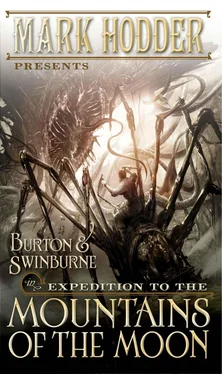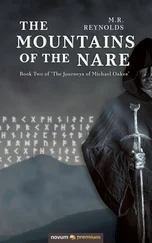Mark Hodder - Expedition to the Mountains of the Moon
Здесь есть возможность читать онлайн «Mark Hodder - Expedition to the Mountains of the Moon» весь текст электронной книги совершенно бесплатно (целиком полную версию без сокращений). В некоторых случаях можно слушать аудио, скачать через торрент в формате fb2 и присутствует краткое содержание. Жанр: sf_stimpank, на английском языке. Описание произведения, (предисловие) а так же отзывы посетителей доступны на портале библиотеки ЛибКат.
- Название:Expedition to the Mountains of the Moon
- Автор:
- Жанр:
- Год:неизвестен
- ISBN:нет данных
- Рейтинг книги:5 / 5. Голосов: 1
-
Избранное:Добавить в избранное
- Отзывы:
-
Ваша оценка:
- 100
- 1
- 2
- 3
- 4
- 5
Expedition to the Mountains of the Moon: краткое содержание, описание и аннотация
Предлагаем к чтению аннотацию, описание, краткое содержание или предисловие (зависит от того, что написал сам автор книги «Expedition to the Mountains of the Moon»). Если вы не нашли необходимую информацию о книге — напишите в комментариях, мы постараемся отыскать её.
Expedition to the Mountains of the Moon — читать онлайн бесплатно полную книгу (весь текст) целиком
Ниже представлен текст книги, разбитый по страницам. Система сохранения места последней прочитанной страницы, позволяет с удобством читать онлайн бесплатно книгу «Expedition to the Mountains of the Moon», без необходимости каждый раз заново искать на чём Вы остановились. Поставьте закладку, и сможете в любой момент перейти на страницу, на которой закончили чтение.
Интервал:
Закладка:
“I rendered your attacker unconscious with a blow to the head,” Isambard Kingdom Brunel explained.
“Wait! Stop!” Burton shouted. “Put me down.”
The engineer complied. Burton clutched his left side and groaned. He pointed to a heavy door, barely visible through the steam and dust.
“The vault, Isambard! Get in there!”
The Steam Man clanged across the broken floor and started to work on the portal.
Burton stood, swaying, waiting. He turned his head to the side and spat. The taste of blood filled his mouth.
The siren was still wailing. He remembered the echoing “Ulla! Ulla!” of the wartime harvesters.
It happened , he reminded himself.
With a loud thunk , the vault door came loose. Brunel stepped aside, carrying it with him.
Burton limped forward and entered the chamber. He looked around and saw things he didn't understand: bizarre biological objects in bell jars; devices that looked like weapons; a necklace of shrunken non-human heads; a mirror that reflected a different room, and, when he looked into it, a different person.
“You were right, Algy,” he muttered, for these things, he felt sure, had somehow slipped through from alternate versions of reality.
A flat jewel case caught his eye. He reached for it, opened it, and saw that it contained twenty-one black diamonds arranged in three rows of seven: the fragments of the Eyes of Naga.
He snapped the case shut and was just about to leave with it when he noticed a particularly large leather portmanteau. He paced over to it, pulled it open, and saw white scaly material, a black helmet, a metal disk, and a pair of stilted boots inside. It was Edward Oxford's burned and battered time suit; the weird costume that had earned him the name “Spring Heeled Jack.”
Burton picked up the bag and left the vault.
Krishnamurthy's voice came out of the dust cloud: “Hurry! This is taking too long! They'll be back any minute!”
The king's agent found the door of the Worm and clambered into the vehicle. He sat and let loose a sob as his ribs grated together. Brunel's great bulk entered. The Steam Man pulled the hatch shut.
“Are you all right, Countess?” Burton asked.
“Yes,” the clairvoyant answered. “But you're hurt, Captain!”
“It's nothing.”
“Dick-” Speke began.
Burton cut him off: “Let's get out of here first, John. Explanations later.”
They manoeuvred themselves around the cabin until Brunel was comfortably at the controls. He set the engine roaring and reversed the Worm back into the tunnel it had drilled.
With the short legs around its circumference racing, the machine hurtled along underground, passing far beneath the River Thames, following the burrow westward until it angled upward and emerged from the wasteland at the front of Battersea Power station.
They all disembarked, striding and clanking and limping to the main doors, passing through them, crossing the courtyard, and entering the principal workshop.
Technologist personnel gathered around. Brunel ordered them to secure the building.
The group moved over to a workbench. Burton laid the diamond case and the portmanteau on it. Krishnamurthy walked away and returned with the Lee-Enfield rifle. “Here you are, Captain.”
“Thank you, Maneesh. By the way, was Mrs. Angell organising a bonfire when you visited?”
“She was, sir, and she seemed rather distraught about it.”
“If what I have in mind doesn't succeed,” Burton said, addressing all of his friends, “then, at very least, I want the evidence of what has occurred destroyed. Thus I've instructed my housekeeper to burn all of my records.”
“But why is that necessary?” Speke asked.
The Countess Sabina answered: “Different versions of history exist, Mr. Speke-I've seen them-and the boundaries between each are thin. If the wrong sort of person learned of this, they could make a Bedlam of all existence.”
Burton thought of Aleister Crowley.
“We're almost ready,” one of the technicians announced.
The king's agent turned to Speke. “Walk with me, John.”
John Hanning Speke, lying flat on his back on a workbench, allowed Isambard Kingdom Brunel to remove the cover of the babbage in the left half of his skull.
The engineer used a pincer to indicate two hollows in the exposed mechanism.
“See, Sir Richard,” he said. “These sockets were designed to receive two of the Cambodian stones.”
Burton examined the cavities, then looked down at Speke. “You understand why we have to do this, John?” he asked.
“Yes,” Speke replied. “Put them in.”
The king's agent nodded to Brunel, and the engineer reached into the jewel case, retrieved a diamond, fitted it into one of the slots in Speke's babbage, and screwed down a delicate bracket to hold the stone in place. He repeated the process with a second gem, then replaced the cover of the device and stood back.
Speke sat up.
“Do you sense anything?” Burton asked.
“Nothing.”
Countess Sabina stepped forward. “I do.”
Burton looked at her. “What do you feel, Countess?”
“The Naga intelligence has left the diamonds, Sir Richard, but the shape of it remains in them, like a mould, if you will. Mr. Speke has to allow his conscious mind to flow into it. That is the role I must play-I shall employ my mediumistic abilities to guide him.”
The king's agent nodded, moved away with Isambard Kingdom Brunel, and asked him: “What of the rest of it, Isambard? Can you generate power enough?”
“Easily,” Brunel replied. “My technicians are setting everything up now. But you realise that, if Mr. Speke cannot manage his part, you will be incinerated?”
“Believe me, I am very aware of that particular fact!”
They walked over to where Krishnamurthy stood by two workbenches. Technicians were positioning them beneath a hanging structure, a thing of multiple layers and looped cables. Brunel gestured toward it.
“This will feed power into Mr. Speke's device. If I have understood the process properly, he will then be able to channel it in the appropriate manner through the resonance that exists between the Cambodian stones and the diamond dust in your tattoo. The unique properties of the diamonds will then come into play and project you through time. Speke will guide you to the exact moment and location.”
“But on previous occasions,” Burton said, “a sacrifice-a death-has been required to activate the process.”
Brunel pointed one of his clamp-ended arms at the workshop entrance. “We hope that will suffice.”
Burton looked and saw a horse being led in.
Krishnamurthy addressed the king's agent: “Why are you aiming for 1840, Sir Richard? Didn't the first alternate history branch off three years earlier?”
“Edward Oxford's initial entry point into the past is the source of all the trouble,” Burton replied. “If I kill him in 1837, he'll still arrive in 1840, and will still assassinate Queen Victoria, whereas, if I kill him in 1840, it will make it impossible for him to be thrown back to 1837.”
“But that means you won't merely change 1840 onward-you'll change the past of the history you are actually in. As far as I understand this whole business, no one has done that before.”
“Cause and effect in reverse, Maneesh.”
Krishnamurthy scratched his head. “Yes. But what will happen to you? To us?”
“I can't be sure-it's all theoretical-but I suspect that all the alternate histories will metamorphose from the Actual to the Potential, if you see what I mean. Whatever act caused each of them to come into being will be nullified, and they'll detach from what was meant to be, like branches being pruned from a bush.”
Читать дальшеИнтервал:
Закладка:
Похожие книги на «Expedition to the Mountains of the Moon»
Представляем Вашему вниманию похожие книги на «Expedition to the Mountains of the Moon» списком для выбора. Мы отобрали схожую по названию и смыслу литературу в надежде предоставить читателям больше вариантов отыскать новые, интересные, ещё непрочитанные произведения.
Обсуждение, отзывы о книге «Expedition to the Mountains of the Moon» и просто собственные мнения читателей. Оставьте ваши комментарии, напишите, что Вы думаете о произведении, его смысле или главных героях. Укажите что конкретно понравилось, а что нет, и почему Вы так считаете.












